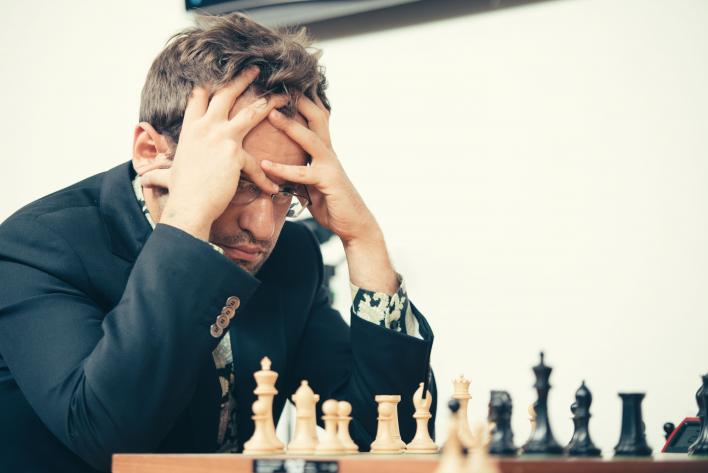
By GM Josh Friedel
Chess styles are diverse. Some players play aggressively from the first move, blitzing out sharp theory and trying to apply immediate pressure from the word go. Others prefer to avoid known paths, seeking to outplay their opponents on unfamiliar terrain. Some are open positions aficionados, while others prefer the long maneuverings of locked games. There are classical players, positional players, hypermodern players, and those who just play straight up strange. On the other hand, I find there are certain similarities between chess players of all stripes. Though the occasional pessimist floats around, most players tend to be optimistic about their position. Nobody likes to defend a worse position where they have no counterplay, and I dare you to show me the person who doesn’t enjoy a good king hunt. There is one particular commonality I’d like to focus on: The tendency to play it safe when tournament victory is on the line. I’ve seen the most combative Grandmasters agree to meek draws when close to the finish line; sometimes even when it doesn’t guarantee first. I’m certainly in no position to judge them—I’ve done it myself more than I’d care to admit. Once in a while there are exceptions, but most of us just don’t take risks when the trophy is in reach. And I think it is a mistake.
The following position was reached in the last round of the 2018 Gibraltar Masters. GM Levon Aronian was on move as white against GM Hikaru Nakamura. Both players were tied for first at 7/9 with three other GMs. There was a huge chasing pack of 6.5s hungry to catch up. What would you do?
Levon took on h5 with the rook, and after Hikaru recaptured, White gave a perpetual with Qg5+. Aronian then impressively fought his way to tournament victory after a grueling series of tiebreaks. It was quite the impressive feat. I think many players, perhaps including myself, would also force the draw in such a situation. Yet in my view, it is not only the wrong objective choice, it is the riskier one.
If White plays a move like Rf4, for instance, I think he has a comfortably better game. Aronian’s king is safer, his rooks are more active, and the bishop on the long diagonal isn’t particular fearsome at this point. Would he win it? I’m not sure, but I would argue that his odds of winning this position are greater than winning a series of rapid playoffs. If one of his fellow 7s had secured a victory, he wouldn’t have had a shot at all. Now, playing it safe isn’t the only explanation for Rxh5. Perhaps he miscalculated and thought he had a win. Maybe he didn’t think his chances of winning were so great, and he preferred to rest up for a possible playoff. But if safety was his motive, despite the successful move it turned out to be, I think that his choice was the far riskier one.
All players, at least the human ones, get a little nervous when the trophy is near. Making correct decisions is difficult. There is no universal rule to follow in all situations you could face, but next time you are thinking of playing it safe by veering toward a draw, give it a second thought: You might find it is better, and safer, to take that extra risk.


